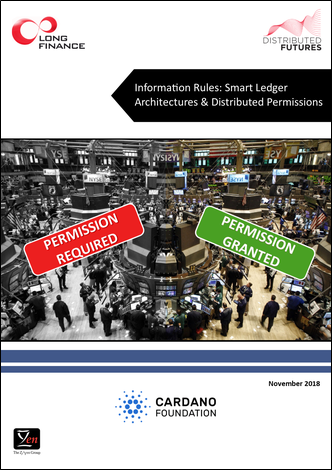Authors
Maury Shenk and Professor Michael Mainelli
Sponsored by
- Cardano Foundation
Published by
Long Finance (November 2018), 63 pages.
Share on social media:




You might also be interested in:
Information Rules: Smart Ledger Architectures & Distributed Permissions
One needs permission from somebody or someone to do pretty much anything these days. Whether it be parking your car, gaining a license, accessing a stock exchange or, more recently and topically, retaining personal data from a client business card, somebody somewhere insists you provide evidence that you have permission.
This paper explores ‘permissions’, i.e. the actions one is allowed to perform with items, and more specifically, permissions surrounding digital items, which are becoming increasingly complex. In order to effectively manage such permissions in contemporary markets, we believe that a new framework for defining and managing distributed permissions is needed: what one might call a species of ‘information rules’.
The goal of this report is to consider how Smart Ledgers could implement such a permissions framework. We intentionally explore new technical approaches, rather than recommending an evolution of current frameworks and technology. We believe that current technical ‘architectures’, largely based around a central third party and its information technology, are giving way to more distributed architectures. These distributed architectures are based on ‘Smart Ledgers’, multi-organisational databases with a super audit trail, typically containing some embedded computer code.
The research was led by Maury Shenk, Managing Director, Lily Innovation and Professor Michael Mainelli, Executive Chairman, Z/Yen Group.
The report concludes that the criteria for successful permissioning systems appear to be:
- Precision – ability to accurately convey permissions;
- Breadth – scope to convey any type of permission;
- Applicability – comprehensibility and practicality of application in real-world markets and related interactions.
The report intriguingly touches on Deontic Logic as an excellent starting place for analysis of permissions, and applies it in a permission table.
See:
“Deontic Logic”, Stanford Encyclopedia of Philosophy, https://plato.stanford.edu/entries/logicdeontic/
“Deontic logic”, Wikipedia, https://en.wikipedia.org/wiki/Deontic_logic
“Mally’s Deontic Logic” Stanford Encyclopedia of Philosophy, https://plato.stanford.edu/entries/mally-deontic/
“Deontic Logic”, Stanford Encyclopedia of Philosophy, https://plato.stanford.edu/entries/logicdeontic/
“Profession G H von Wright" (obituary), The Telegraph (23 June 2003), https://www.telegraph.co.uk/news/obituaries/1433783/Professor-G-H-von-Wright.html




